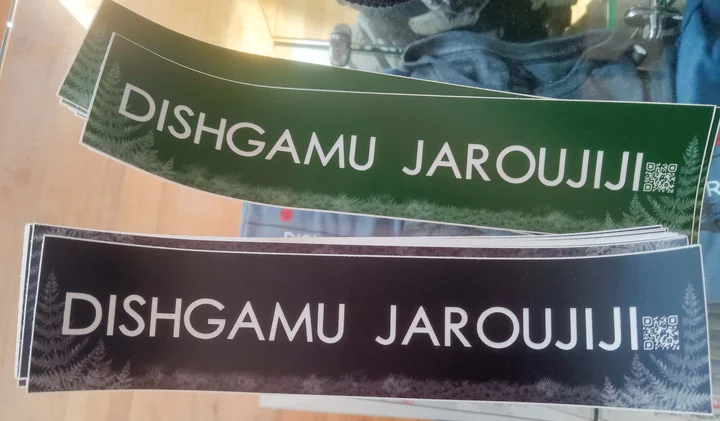“I like Eureka” in the Soulatluk language.
Last week, readers of the Outpost may have noticed that a bridge in Fieldbrook was renamed to a word in the Wiyot language, Soulatluk. Turns out, that’s not a one-off event — the Wiyot Tribe runs an as-yet unnamed program that names or renames some places they agree needs a touch-up.
If someone has a place they’d like named or renamed, they pitch it to Ben Brown, the director of the Wiyot Tribe’s cultural department. Brown takes it to a committee, and if they think it’s worthy of a name, it goes before the Wiyot Tribal Council for final approval. Then it gets kicked to the tribe’s linguists.
Some places have historical Soulatluk names that the linguists can find in Wiyot ethnographies, like the 1918 Ethnography and Archaeology of the Wiyot Territory by L.L. Loud. Other places require a little more creativity. Researchers look for historical activities that took place in the area, or what kind of flora and fauna live there.
“There was recently a Marine Protected Area [who] were redoing their signage,” Brown said. “They wanted a place name for their area in Samoa, and the cultural committee came up with the word — basically, [it translates to] ‘Across the bay, in a place where people used to live,’ or something like that. That’s Soulatluk; it’s not usually, like, valhuk equals ‘salmon,’ it means ‘feasting food,’ and Western society defines it as salmon, and that’s not generally how they approach defining their Soulatluk. It’s descriptive.”
New names are purposefully vague to avoid tempting potential grave diggers or artifact stealers.
So far, the cultural committee has named or renamed about six different places in the four months since the project began. They’re unlikely to run out of work any time soon, though; Brown says the backlog of requests is long, and the process requires at least three to four months.
The services rendered by the tribe aren’t free. The cultural committee charges $100 an hour, and if someone wants a sign in Soulatluk, the committee in charge of that runs $400 an hour total. The Fieldbrook bridge renaming only ran the Humboldt County Board of Supervisors $200, but that process was simple because a historic Soulatluk name for Fieldbrook already existed.
The program’s ideal candidate is a place with an offensive name, like the recently renamed bridge in Fieldbrook. Others are places named after colonizers.
“There’s a lot of power in language,” Brown said. “When you have places named after all of these mass murderers, they were celebrated in the past, but we’re revisiting that history and seeing these people with our modern eyes.”
Brown specifically mentioned the locality of Larabee, a mile from Redcrest — a town named after a man who killed Native Americans during the 1860 Tuluwat Island Massacre.
“That needs to change,” Brown said. “We can’t celebrate these people from that part of history. We know that history has dark and difficult parts to it. But the way to combat that is to bring it into the light … It’s like in Nazi Germany; they didn’t try to sweep it under the rug. There’s memorials for what took place. And as a country, they accepted their role and made amends. They continue to learn from it and move forward. And that’s the exact same thing that needs to take place here — recognize what happened in the past and do whatever we can to make it right.”

CLICK TO MANAGE